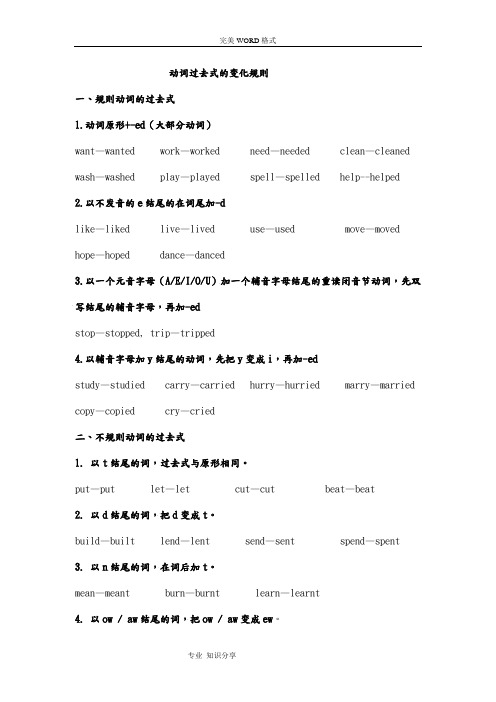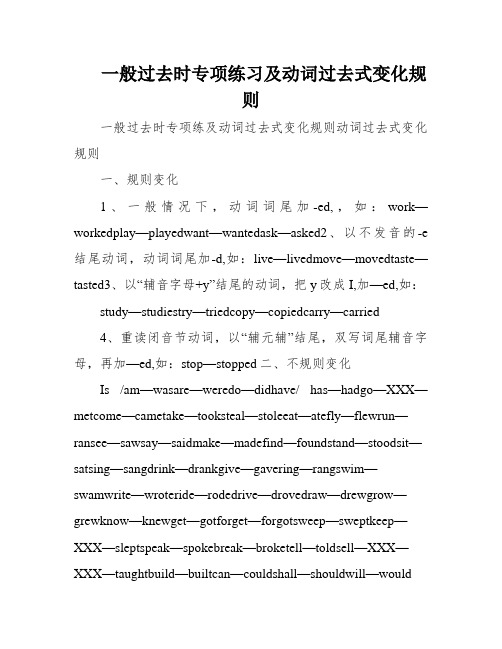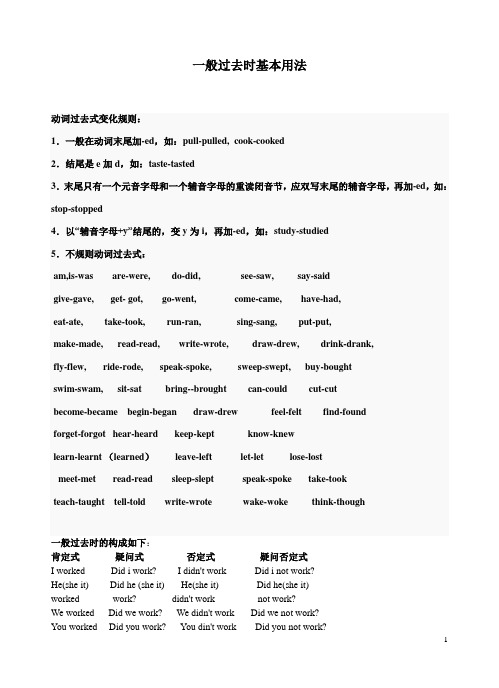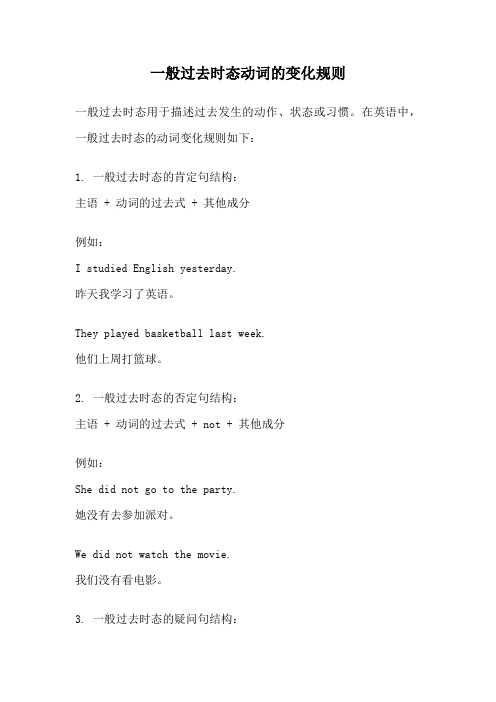一般过去时中动词的变化规则
一般过去时专项练习及动词过去式变化规则

一般过去时专项练习及动词过去式变化规则动词过去式变化规则一、规则变化1、一般情况下,动词词尾加-ed,,如:work—worked play—played want—wanted ask—asked2、以不发音的-e结尾动词,动词词尾加-d,如:live—lived move—moved taste—tasted3、以“辅音字母+y”结尾的动词,把y改成I,加—ed, 如:study—studies try—tried copy—copied carry—carried4、重读闭音节动词,以“辅元辅”结尾,双写词尾辅音字母,再加—ed, 如:stop—stopped二、不规则变化Is /am—was are—were do—did have/ has—had go—went meet—met come—came take—took steal—stole eat—ate fly—flew run—ran see—saw say—said make—made find—found stand—stood sit—sat sing—sang drink—drank give—gave ring—rang swim—swam write—wrote ride—rode drive—drove draw—drew grow—grew know—knew get—got forget—forgot sweep—swept keep—kept sleep—slept speak—spoke break—broke tell—told sell—sold buy—bought think—thought catch—caught teach—taught build—built can—could shall—should will—would过去式与动词原形一样:let—let must—must put—put read—read三、动词过去式构成读音1、清辅音后读清辅音[t] (清读清)如:jump like2、浊辅音后读浊辅音[d] (浊读浊)如:listen pull3、元音后面读浊辅音[d] (元音后面读浊音)如:water play4、[t][d]后面读[id] want need一般过去时专项练习一、写出下列动词的过去式1.am/is ______2.do _______3.go ________4.have _______5.isn’t _________6. ar en’t ________7.spend________8.cook_______9.read________10.clean_______ 11.live _______ 12.study_________三、用括号内所给词的适当形式填空1. We _________ (enjoy) ourselves at the party last night.2.Jack ____________ (study) for the English test last Sunday.3._______ you ______ (go) to the Great Wall last year?4. What day _______ (be) it yesterday?5.The old man _______(be)ill and went to see a doctor.6.We ________ (have) a party last night.7.We __________ (visit) the museum and went home.8.— How _______ (be) the students? — They were very friendly.9.He often _______ (have) supper at home. Today he ______ (have) supper at school.10.— ______ he _______ (have) lunch at nine? —No, he didn’t.11.They _________(buy) a guitar yesterday.五、选择填空( ) 1. Lee ____ his mobile phone at home. A. leave B. leaves C. leaved D. left( ) 2. ___ he ___a good rest? No, he didn’t. A. Do, had B. Did, have C. Did, had D. Was, had ( ) 3. As soon as he __, he _ to his family.A. arrived, writesB. arrived, writtenC. arrived, wroteD. arriveds, write( ) 4. Mr. Black was late because he _______ his way. A. losted B. lose C. loses D. lost ( ) 5. When _________ Lee ________ school this morning?A. did, got toB. did, get toC. did, getD. did, got( ) 6. Will you please say it again? I _ quite __you.A. didn’t, hearB. don’t, heardC. didn’t, heardD. don’t, hear( ) 7. _you __at six o’clock yesterday? A. Do ,ge t up B. Did, get up C. Do, got up D. Did, got up ( ) 8.What did you see ____? A. now B. every day C. these days D. just now( ) 9.He went into the room and ____ the door. A. lock B. locking C. locks D. locked ( ) 10. What __ you __last week? I bought a bag.A. did ,buy B. did , bought C. do, buy D. do, bought ( ) 11. —__he __his lunch? — Yes, he did. A. Does ,has B. Does, have C. Did, have D. Did, had ( )12.—Did the thieves _____ into the car? —No, they______.A. fell, didn’tB. fall(落下), didC. jump(跳), didn’tD. jump, did( ) 13. -When did May come back from Hong Kong? -She __ from Hong Kong last Friday.A. come backB. comes backC. returned backD. came back( ) 14. ____ she _____ this dictionary in the bookshop nearby last week?A. Did, buyB. Does, buyC. Did, boughtD. Does, buys( ) 15. He ____ to the station this morning and was______ for the train.A. hurry, in timeB. hurries, on timeC. hurried, in timeD. hurried, at time( ) 16. Where _____ Uncle Sun yesterday? A. was B. were C. did D. does( ) 17. —Have you seen him today? —Yes, I ____ him this morning.A. seeingB. seeC. seesD. saw( ) 18. He ____worried when he heard the news. A. is B. was C. does D. did( ) 19. There ___ a telephone call for my brother Steven yesterday? A. is B. are C. was D. were ( ) 20. Liu Fengwei _____ three yuan for the lost library book.A. paidB. payC. spentD. lost( ) 21. He __ in this school in 1958. A. taught B. teach C. teaches D. teaching( ) 22. They __ tired so they stopped __a rest.A. are, haveB. were, haveC. were, to haveD. are, having( ) 23. Yesterday I _____ in bed all day because I had a fever. A. lay B. lie C. laid D. lied ( ) 24. It was raining hard when he ____ home. A. got B. get C. gets D. was getting( ) 25. She said her brother ____ in Beijing. He ______ to Japan on business last week.A. wasn’t, wentB. hasn’t, wentC. wasn’t, goD. isn’t, went七、用所给动词的适当形式填空1.Tom and Mary ___________ (come) to China last month.2.Mary __________ (read) English yesterday morning.3.There _________ (be) no one here a moment ago.4.I ___________ (call) Mike this morning.5.I listened but ___________ (hear) nothing.6.Tom ___________ (begin) to learn Chinese last year.st week we _________ (pick) many apples on the farm.8.My mother ________________ (not do) housework yesterday.9.She watches TV every evening. But she _______________ (not watch) TV last night.10.________ your father ________ ( go ) to work every day last year?st year the teacher ___________ (tell) us that the earth moves around the sun.12.There ____________ a telephone call for you just now. (be)13.There __________ not enough people to pick apples that day. ( be)14.There _____________ any hospitals (医院) in my hometown (家乡) in 1940. ( be not)15.There ____________ enough milk at home last week, wasn’t there?16.Eli ____________ to Japan last week. ( move)17. –When _______ you _________ (come) to China? - Last year.18.Did she ________ (have) supper at home?19.Jack ____________ (not clean) the room just now.20._________ (be) it cold in your city yesterday?21.How many people ________ (be) there in your class last term?22.It ________ (be) hot yesterday and most children _______ (be) outside.23. There ________ (be) a football match on TV yesterday evening, but I _________ (have) no time to watch it.24. He ate some bread and _________ (drink) some milk.25. ________ he __________ (finish) his homework last night?26. I__________(be) tired yesterday.27. What _________ you ___________ (do) last night?28. My grandfather _________ (leave) Hong Kong for New York in 1998.29. What _______ he ________ (do) yesterday?30. Last week I _______ (buy) a new bike.31. He ________ (be) here just now.32. He __________ (not find ) his key last night.33. My father __________ (drink) a lot of wine yesterday.。
一般过去式动词和句型变化规律

动词过去式的变化规则一、规则动词的过去式1.动词原形+-ed(大部分动词)want—wanted work—worked need—needed clean—cleaned wash—washed play—played spell—spelled help--helped 2.以不发音的e结尾的在词尾加-dlike—liked live—lived use—used move—moved hope—hoped dance—danced3.以一个元音字母(A/E/I/O/U)加一个辅音字母结尾的重读闭音节动词,先双写结尾的辅音字母,再加-edstop—stopped, trip—tripped4.以辅音字母加y结尾的动词,先把y变成i,再加-edstudy—studied carry—carried hurry—hurried marry—married copy—copied cry—cried二、不规则动词的过去式1. 以t结尾的词,过去式与原形相同。
put—put let—let cut—cut beat—beat2. 以d结尾的词,把d变成t。
build—built lend—lent send—sent spend—spent 3. 以n结尾的词,在词后加t。
mean—meant burn—burnt learn—learnt4. 以ow / aw结尾的词,把ow / aw变成ew。
blow—blew draw—drew know—knew grow—grew 5. 含有双写字母的词,将双写改为单写,在词尾加t。
keep—kept sleep—slept feel—felt smell—smelt 6. 含有元音字母o / i的词,将o / i变成a。
sing—sang give—gave sit—sat drink—drank 我们目前已学动词的过去式什么时候用一般过去时呢???1.表示在过去某一时间内发生的动作或情况◆①带有确定的过去时间状语morning five daysyesterday afternoon one week agoevening three minutesthe day before yesterday three hoursyear morninglast month one dayday the other daythat year 其他 when I was youngmorning just noweg. I went to school on foot yesterday.I finished my homework last week.◆②没有确定的过去时间状语时eg. I thought you were ill. 我原以为你生病了(这句话说明在说话之前我以为你病了,但是现在我知道你没病)2.表示过去一段时间内经常或反复发生的动作(常与always,never,often 等频度副词连用)eg. Peter always carried an umbrella. Peter 常常带着伞I never drank wine. 我从不喝酒一般过去时的句型肯定句:主语+行为动词过去式/be动词过去式eg : We played football yesterday.I was happy last night.否定句:did not / didn’t + 行为动词原型Was not / wasn’t + 其他Were not / weren’t + 其他eg:I didn’t finish my homework.I wasn’t happy last night.We weren’t finish our team work.一般疑问句:Did + 主语 + 行为动词原型?Was /Were + 主语 + 其他成分eg: -----Did you go shopping yesterday?-----Yes, I did. / No ,I didn’t.Was she 15 years old last year?特殊疑问句;特殊疑问词 + did + 主语 + 行为动词原型?特殊疑问词was / were + 主语 + 其他成分?eg: Where did you go on vacation?When and where were you born?一般过去时练习题一、单项选择:从下列各题后所给的四个选项中选择最佳答案填空。
动词形式变化规则

动词形式变化规则1. 一般现在时(Simple Present Tense):- 第三人称单数主语变化形式:在动词原形后加-s或-es,如:go (原形)→goes(第三人称单数形式)- 其他人称变化形式:动词原形不变,如:I/you/we/they go.2. 一般过去时(Simple Past Tense):- 动词原形变化形式:在动词原形后加-ed或-d,如:work→worked - 部分特殊变化形式:如:be→was/were, go→went, have→had3. 现在进行时(Present Continuous Tense):- 助动词be的不同形式变化:am/is/are- 动词原形+ing,如:play→playing, eat→eating4. 过去进行时(Past Continuous Tense):- 助动词be的过去形式(was/were)+动词原形+ing,如:I was studying.5. 一般将来时(Simple Future Tense):- 助动词will/shall+动词原形,如:I will go.6. 现在完成时(Present Perfect Tense):- 助动词have/has+动词过去分词,如:I have finished.7. 过去完成时(Past Perfect Tense):- 助动词had+动词过去分词,如:He had seen the movie.8. 一般将来完成时(Future Perfect Tense):9. 被动语态(Passive Voice):- 助动词be的不同形式变化+动词过去分词,如:The book was written by the author.此外,还有其他特殊动词的变化规则,如不规则动词的变化规则。
总体而言,动词形式变化规则是根据不同的时态、语态和语气,使用不同的助动词或动词形式来表达动词在不同情况下的变化。
一般过去时专项练习及动词过去式变化规则

一般过去时专项练习及动词过去式变化规则一般过去时专项练及动词过去式变化规则动词过去式变化规则一、规则变化1、一般情况下,动词词尾加-ed,,如:work—workedplay—playedwant—wantedask—asked2、以不发音的-e 结尾动词,动词词尾加-d,如:live—livedmove—movedtaste—tasted3、以“辅音字母+y”结尾的动词,把y改成I,加—ed,如:study—studiestry—triedcopy—copiedcarry—carried4、重读闭音节动词,以“辅元辅”结尾,双写词尾辅音字母,再加—ed,如:stop—stopped二、不规则变化Is /am—wasare—weredo—didhave/ has—hadgo—XXX—metcome—cametake—tooksteal—stoleeat—atefly—flewrun—ransee—sawsay—saidmake—madefind—foundstand—stoodsit—satsing—sangdrink—drankgive—gavering—rangswim—swamwrite—wroteride—rodedrive—drovedraw—drewgrow—grewknow—knewget—gotforget—forgotsweep—sweptkeep—XXX—sleptspeak—spokebreak—broketell—toldsell—XXX—XXX—taughtbuild—builtcan—couldshall—shouldwill—would曩昔式与动词真相一样:let—letmust—mustput—putread—read三、动词过去式构成读音1、清辅音后读清辅音[t](清读清)如:XXX2、浊辅音后读浊辅音[d](浊读浊)如:listenpull3、元音背面读浊子音[d](元音背面读浊音)如:waterplay4、[t][d]后面读[id] wantneed普通曩昔时专项操演一、写出下列动词的过去式1.am/is______2.do_______3.go________4.have_______5.isn’t_________6.aren’t________7.spend_______ _8.cook_______9.read________10.clean_______ 11.live _______ 12.study_________3、用括号内所给词的恰当方式填空1. We _________ (enjoy) ourselves at the party last night.2.XXX ____________ (study) for the English test last Sunday.3._______ you ______ (go) to the Great Wall last year?4. What day _______ (be) it yesterday?5.The old man _______(be)ill and went to see a doctor.6.We ________ (have) a party last night.7.We __________ (visit) the museum and went home.8.—How _______ (be) the students?—They were very friendly.9.He often _______ (have) supper at home. Today he ______ (have) XXX.10.—______ he _______ (have) lunch at nine?—No, he didn’t.11.They _________(buy) a guitar yesterday.5、挑选填空() 1. Lee ____ his mobile phone at home.A. XXX() 2. ___ he ___agood rest? No, he didn’t.A. Do, hadB. D id, haveC. Did, had D. Was, had() 3. As soon as he __, he _to his family.A. arrived, writesB. arrived, writtenC. arrived, wroteD. arriveds, write() 4. Mr. Black was late because he _______ XXX()5. When _________ Lee ________ school this morning?A. did, got toB. did, get toC. did, getD. did, got() 6. Will you please say it again? I _quite __you.A. XXX’t, XXX’t, XXX’t, XXX’t, hear() 7. _you __at six o’clock yesterday? A. Do ,get upB. Did, get upC. Do, got upD. Did, got up() 8.What did you see ____? A. nowB. every dayC. these daysD. just now() 9.He went into theroom and ____ XXX() 10. What __ you __last week? I bought a bag.A. did ,buy B. did , bought C. do, buy D. do, bought() 11.—__he __his lunch?—Yes, he did. A. Does ,hasB. Does, haveC. Did, haveD. Did, had()12.—Did the thieves _____ into the car?—No, they______.A. fell, XXX’tB.fall(落下), XXX(跳), XXX, did() 13. -When did May come back from Hong Kong?-She __ from Hong Kong last Friday.A. come XXX() 14. ____ she _____ XXX?A. Did, buyB. Does, buyC. Did, boughtD. Does, XXX() 15. He ____ to the station this morning and was______ for the train.A. hurry, XXX hurries, XXX hurried, in timeD. hurried, at time() 16. Where _____ XXX() 17.—Have you seen him today?—Yes, I ____ him this morning.A. XXX() 18. He ____worried when he heard the news. A. isB. wasC. doesD. did() 19. There ___ a telephone call for my brother Steven yesterday?A. isB. are C. was D. were() 20. Liu Fengwei _____ three yuan for the lost library book.A. XXX() 21. He __ in this school in 1958.A. XXX() 22. They __ tired so they stopped __a rest.A. are, haveB. were, haveC. were, to haveD. are, having() 23. XXX I _____ in bed all day because I had a XXX() 24. It was raining hard when he ____ home.A. gotB. getC. getsD. was getting() 25. She said her brother ____ in Beijing. He ______ to Japan on business last week.A. wasn’t, XXX’t, XXX’t, goD. isn’t, went七、用所给动词的适当形式填空1.Tom and Mary ___________ (come) to China last month.2.Mary __________ (read) XXX.3.There _________ (be) no one here a moment ago.4.I ___________ (call) Mike this morning.5.I listened but ___________ (hear) nothing.6.Tom ___________ (begin) to learn Chinese last year.。
一般过去时及动词的过去式变化规则

一般过去时及动词的过去式变化规则一般过去时1)、表示过去发生的动作或出现的状态,用动词的过去式来表达,如:I was at the library yesterday afternoon.Tom studied hard and did well in the final exam last year.2)、动词的过去式分为规则动词和不规则动词两种:规则动词的过去式:①一般情况下在动词原形后直接加-ed。
wanted,played②以不发音的字母e结尾的动词,直接加-d。
hoped,lived③重读闭音节单词如果末尾只有一个辅音字母需双写最后一个辅音字母,再加-ed stopped④以辅音字母+y结尾的动词变y为i,再加-ed。
studied,worried以元音字母+y结尾的动词,直接加-ed. played, enjoyed规则动词过去式的读音也有规律可循。
请记住:清后[t],元浊[d],[t] [d]之后读[id]。
①清辅音后,ed要读[t]。
worked,finished②元音或浊辅音后,ed要读[d]。
lived,called③[t]或[d]后,ed读[id]。
started,needed不规则动词有其自己的变化形式,只能分别记忆。
1. go -went2.take-took3. have-had4.buy-bought5. eat-ate6.see-saw7. hang-hung(悬挂)8.meet-met9. win-won(赢得) 10.sleep-slept 11. put-put e-came13. wake-woke(醒)14.read-read 15let-let (详见课本《不规则动词表》)3)句式及其变化:a. be动词过去式的句式:否定句是在was/were后面加not,was not (wasn't)/were not (weren't)。
一般疑问句是把was / were提前并放到句首,要求首字母要大写b. 实义动词过去式的句式:①肯定式:主语+动词过去式+其它。
一般过去时动词变化规则

一般过去时动词变化规则一般过去时是英语中最常用的时态之一,用来表示过去发生的动作或状态。
在使用一般过去时时,动词的变化规则是非常重要的。
下面将介绍一般过去时动词的变化规则及其用法。
一般过去时的动词变化规则:1. 对于大多数动词,一般过去时的构成是在动词原形的基础上加上-ed结尾。
例如:work → worked,play → played,study→ studied等。
2. 对于以不发音的-e结尾的动词,只需要加上-d结尾。
例如:live → lived,love → loved,hate → hated等。
3. 对于以辅音字母+y结尾的动词,变化时将y变为i,再加上-ed结尾。
例如:carry → carried,study → studied,try → tried等。
4. 对于以重读闭音节结尾的单词,要双写最后一个辅音字母,再加上-ed结尾。
例如:stop → stopped,plan → planned,refer → referr ed等。
5. 不规则动词的过去式需要通过记忆来掌握,例如:go → went,eat → ate,drink → drank等。
一般过去时的用法:1. 表示过去的动作或状态。
例如:She worked in a bank last year.(她去年在一家银行工作。
)2. 表示过去的习惯性动作。
例如:He always played football after school.(他放学后总是踢足球。
)3. 表示过去的真实条件。
例如:If I had time, I would go with you.(如果我有时间,我会和你一起去。
)总结:一般过去时的动词变化规则是非常重要的,掌握好这些规则可以帮助我们正确地使用一般过去时。
除了掌握动词的变化规则外,我们还需要注意一般过去时的用法,这样才能在实际运用中做到恰如其分。
希望通过本文的介绍,读者们能够更好地掌握一般过去时的动词变化规则及其用法。
一般过去时基本用法

一般过去时基本用法动词过去式变化规则:1.一般在动词末尾加-ed,如:pull-pulled, cook-cooked2.结尾是e加d,如:taste-tasted3.末尾只有一个元音字母和一个辅音字母的重读闭音节,应双写末尾的辅音字母,再加-ed,如:stop-stopped4.以“辅音字母+y”结尾的,变y为i,再加-ed,如:study-studied5.不规则动词过去式:am,is-was are-were, do-did, see-saw, say-saidgive-gave, get- got, go-went, come-came, have-had,eat-ate, take-took, run-ran, sing-sang, put-put,make-made, read-read, write-wrote, draw-drew, drink-drank,fly-flew, ride-rode, speak-spoke, sweep-swept, buy-boughtswim-swam, sit-sat bring--brought can-could cut-cutbecome-became begin-began draw-drew feel-felt find-foundforget-forgot hear-heard keep-kept know-knewlearn-learnt (learned) leave-left let-let lose-lostmeet-met read-read sleep-slept speak-spoke take-tookteach-taught tell-told write-wrote wake-woke think-though一般过去时的构成如下:肯定式疑问式否定式疑问否定式I worked Did i work? I didn't work Did i not work?He(she it) Did he (she it) He(she it) Did he(she it)worked work? didn't work not work?We worked Did we work? We didn't work Did we not work?You worked Did you work? You din't work Did you not work?They worked Did they work? They didn't work Did they not work?1.一般过去时常表示过去某一时间所发生的动作或存在的状态。
一般过去时态动词的变化规则

一般过去时态动词的变化规则一般过去时态用于描述过去发生的动作、状态或习惯。
在英语中,一般过去时态的动词变化规则如下:1. 一般过去时态的肯定句结构:主语 + 动词的过去式 + 其他成分例如:I studied English yesterday.昨天我学习了英语。
They played basketball last week.他们上周打篮球。
2. 一般过去时态的否定句结构:主语 + 动词的过去式 + not + 其他成分例如:She did not go to the party.她没有去参加派对。
We did not watch the movie.我们没有看电影。
3. 一般过去时态的疑问句结构:Did + 主语 + 动词原形 + 其他成分?例如:Did you finish your homework?你完成作业了吗?Did they visit their grandparents?他们去拜访祖父母了吗?4. 动词的过去式变化规则:一般来说,动词的过去式可以通过在动词原形后面加上-ed来构成。
但是也有一些不规则动词需要记忆其过去式形式。
例如:work - worked工作 - 工作过play - played玩 - 玩过study - studied学习 - 学习过go - went去 - 去过5. 一般过去时态的时间状语:一般过去时态常常和表示过去的时间状语词连用,以明确动作发生的时间。
例如:yesterday昨天last week上周two hours ago两小时前in 1990在1990年总结起来,一般过去时态的动词变化规则包括了动词的过去式构成以及肯定句、否定句和疑问句的结构。
在使用一般过去时态时,我们需要根据句子结构和上下文来确定动词的过去式形式,同时注意使用适当的时间状语词来明确动作发生的时间。
通过掌握这些规则,我们可以更准确地描述过去发生的事情,使我们的句子更加流利和地道。
